Kitchens without upper cabinets represent a transformative design approach that prioritizes openness, natural light, and visual spaciousness over traditional storage solutions. This minimalist kitchen trend has gained tremendous momentum among homeowners seeking to create more breathable, contemporary spaces that feel larger and more inviting. By eliminating wall-mounted cabinetry, these designs allow windows to take center stage, flooding work areas with natural illumination while creating seamless sight lines throughout the home. The absence of upper storage forces creative thinking about organization, leading to innovative solutions like expansive kitchen islands, floating shelves, and strategic pantry spaces. Whether you're working with a compact galley layout or a sprawling open-plan design, removing upper cabinets can dramatically alter your kitchen's atmosphere, making it feel more like a living space than a utilitarian work zone.
1. Floating Shelf Kitchen Storage

Floating shelves create the perfect middle ground between completely bare walls and traditional upper cabinetry. These streamlined storage solutions appear to hover weightlessly, maintaining visual openness while providing essential space for dishes, glassware, and decorative items. The key lies in thoughtful placement and consistent styling. Group similar items together, mix functional pieces with beautiful ceramics, and ensure shelves align with your sight lines for maximum impact. Strategic lighting beneath each shelf enhances both functionality and ambiance, creating a gallery-like display for your favorite kitchen pieces while keeping everyday essentials within easy reach.
2. Kitchen Island Storage Solutions
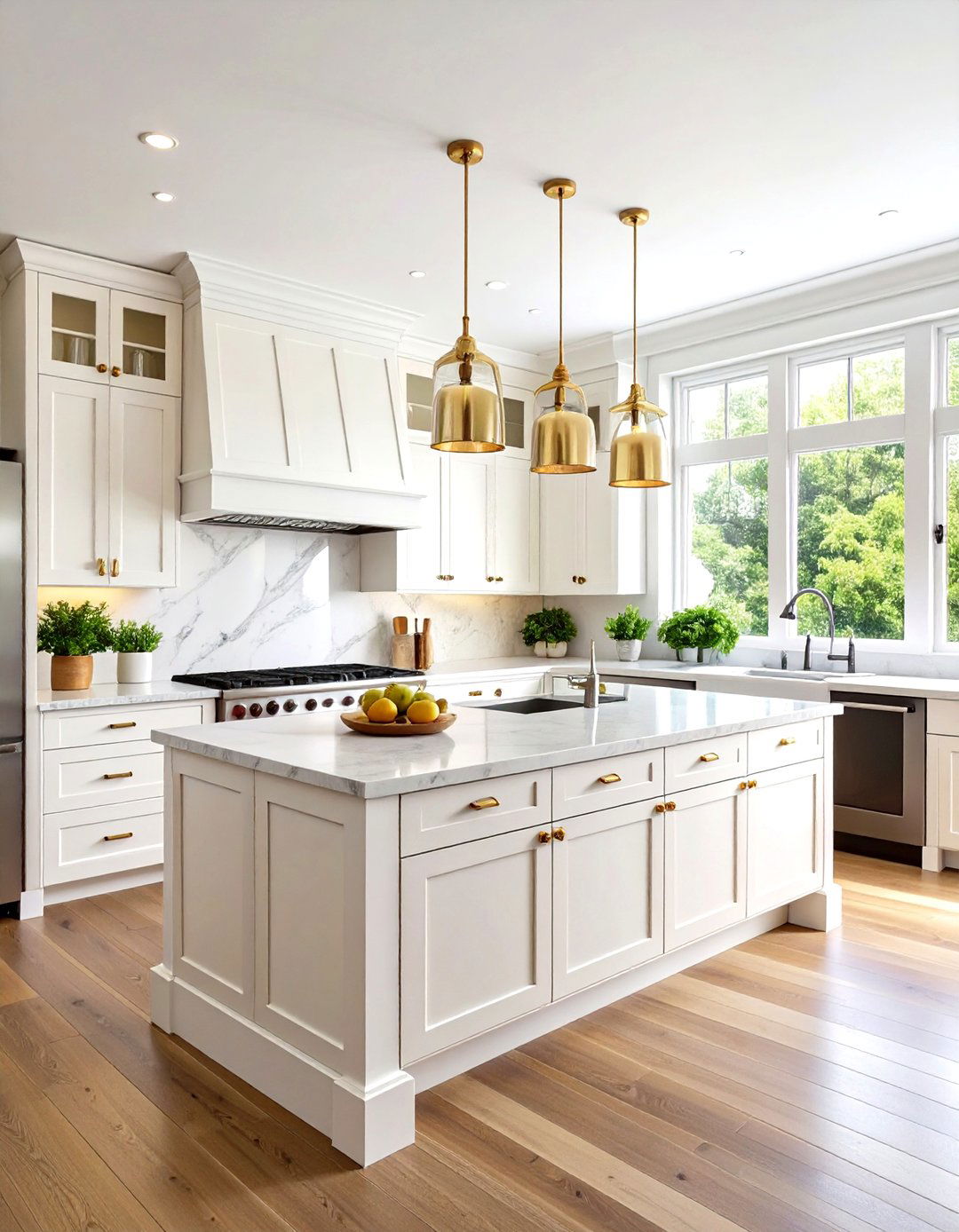
A well-designed kitchen island becomes the storage powerhouse when upper cabinets disappear. Modern islands incorporate deep drawers, pull-out organizers, and specialized compartments that maximize every cubic inch of space. Consider multi-level designs with raised breakfast bars, integrated wine storage, or hidden appliance garages. The island's perimeter offers opportunities for open shelving, towel bars, and even cookbook displays. With strategic planning, a single substantial island can replace the storage capacity of multiple upper cabinets while providing additional workspace and social gathering areas that transform your kitchen into the heart of your home.
3. Floor-to-Ceiling Pantry Walls

When wall space opens up without upper cabinets, dedicated pantry areas become essential. Floor-to-ceiling storage walls maximize vertical space with sleek, streamlined cabinetry that disappears into the architecture. These full-height units accommodate everything from small appliances to bulk storage, freeing your main kitchen walls for windows and open display. Internal organizers, pull-out drawers, and adjustable shelving ensure every item has its designated place. The clean lines of floor-to-ceiling storage create visual cohesion while maintaining the open, airy feeling that makes kitchens without upper cabinets so appealing to modern homeowners.
4. Window Wall Kitchen Design
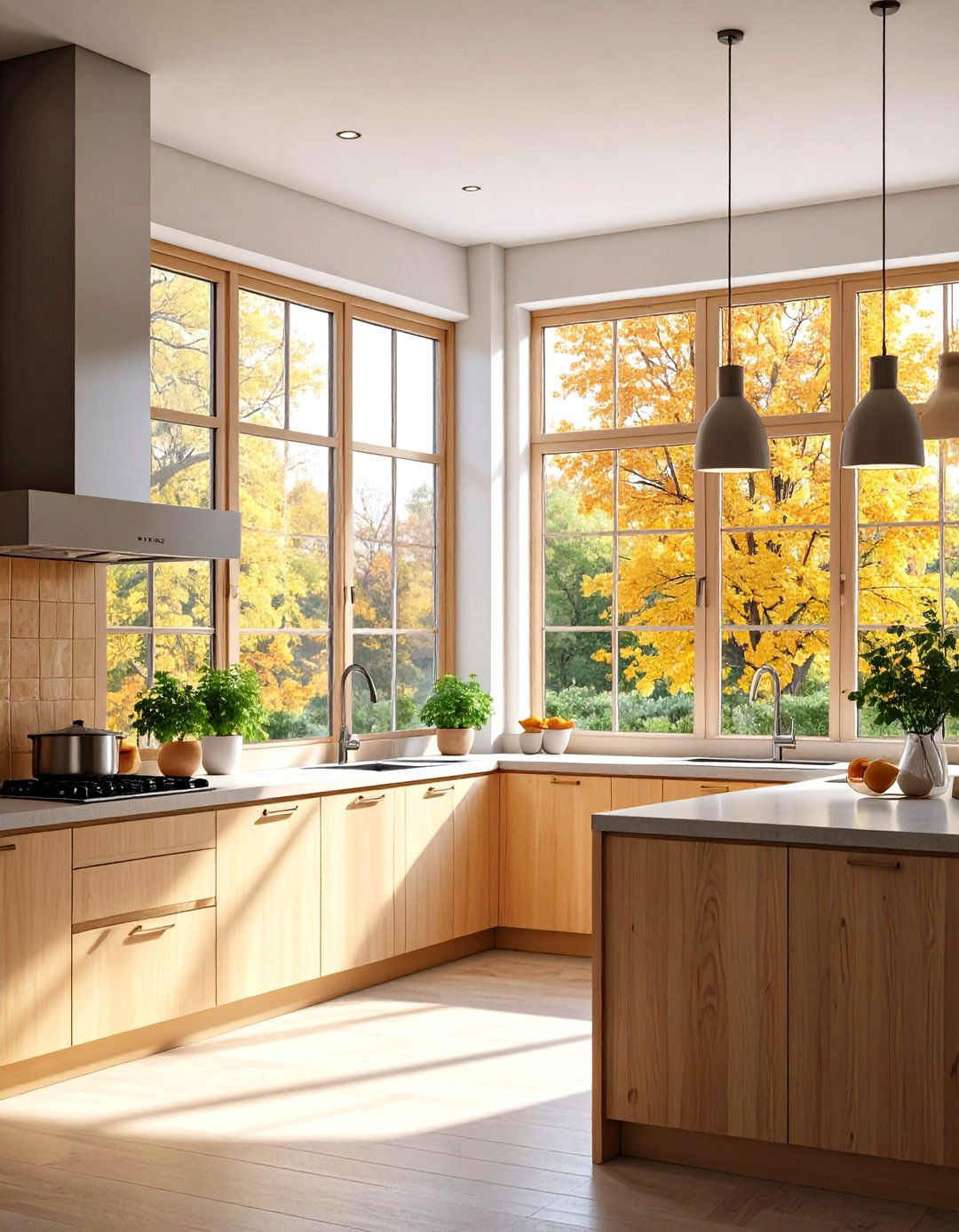
Can you imagine starting each morning surrounded by natural light flooding your workspace? Window walls replace traditional upper cabinet zones with expansive glass that connects your kitchen to the outdoors. This approach works particularly well above sinks and primary work areas where task lighting traditionally suffered under cabinet shadows. Large picture windows, casement combinations, or even garden windows create focal points while providing essential ventilation for cooking activities. The unobstructed views make even compact kitchens feel spacious and connected to nature, transforming daily meal preparation into a more pleasant, inspiring experience filled with changing outdoor scenery.
5. Open Shelving Display Systems

Transform your kitchen walls into curated displays with open shelving systems that showcase your personality and style preferences. These arrangements work best when you treat them like gallery installations, carefully balancing functional items with decorative elements. Mix vintage ceramics with modern glassware, incorporate small plants or artwork, and maintain consistent color schemes for visual harmony. The key to successful open shelving lies in regular editing and thoughtful arrangement. Items should earn their place through either beauty or frequent use, creating displays that feel intentional rather than cluttered, while maintaining easy access to daily essentials.
6. Minimalist Kitchen Design

Minimalist kitchens without upper cabinets embody the "less is more" philosophy, focusing on clean lines, quality materials, and purposeful design choices. Every element serves multiple functions while maintaining visual simplicity. Integrated appliances disappear into streamlined cabinetry, while continuous surfaces create seamless work zones. Storage becomes invisible through clever built-ins and hidden compartments. Color palettes remain neutral and calming, allowing architectural details and natural light to take precedence. The absence of visual clutter creates a serene environment where cooking becomes a meditative practice, proving that functional kitchens can also serve as peaceful retreats from busy daily life.
7. Galley Kitchen Without Uppers

Galley kitchens benefit tremendously from eliminating upper cabinets, as the narrow space immediately feels more open and navigable. Without wall-mounted storage creating visual barriers, these linear kitchens appear wider and more welcoming. The corridor effect diminishes when sight lines extend unobstructed from one end to the other. Strategic placement of appliances and storage creates efficient work triangles within the compact footprint. Long, narrow windows or skylights become possible when upper cabinets don't compete for wall space. The result transforms what could feel like a tight workspace into an efficient, airy cooking environment that maximizes every available inch.
8. Corner Kitchen Layout Storage

Corner kitchens present unique opportunities when upper cabinets are removed, allowing windows to wrap around the space and flood it with light from multiple directions. These layouts benefit from creative corner storage solutions like lazy Susans, swing-out organizers, and custom-fitted drawer systems that access typically dead space. The L-shaped configuration naturally creates distinct zones for preparation, cooking, and cleanup. Without upper cabinets blocking views, the corner layout feels more open to adjacent living spaces. Strategic placement of floating shelves or single statement pieces in corner areas creates visual interest without overwhelming the clean, open aesthetic.
9. Kitchen Peninsula Design Features
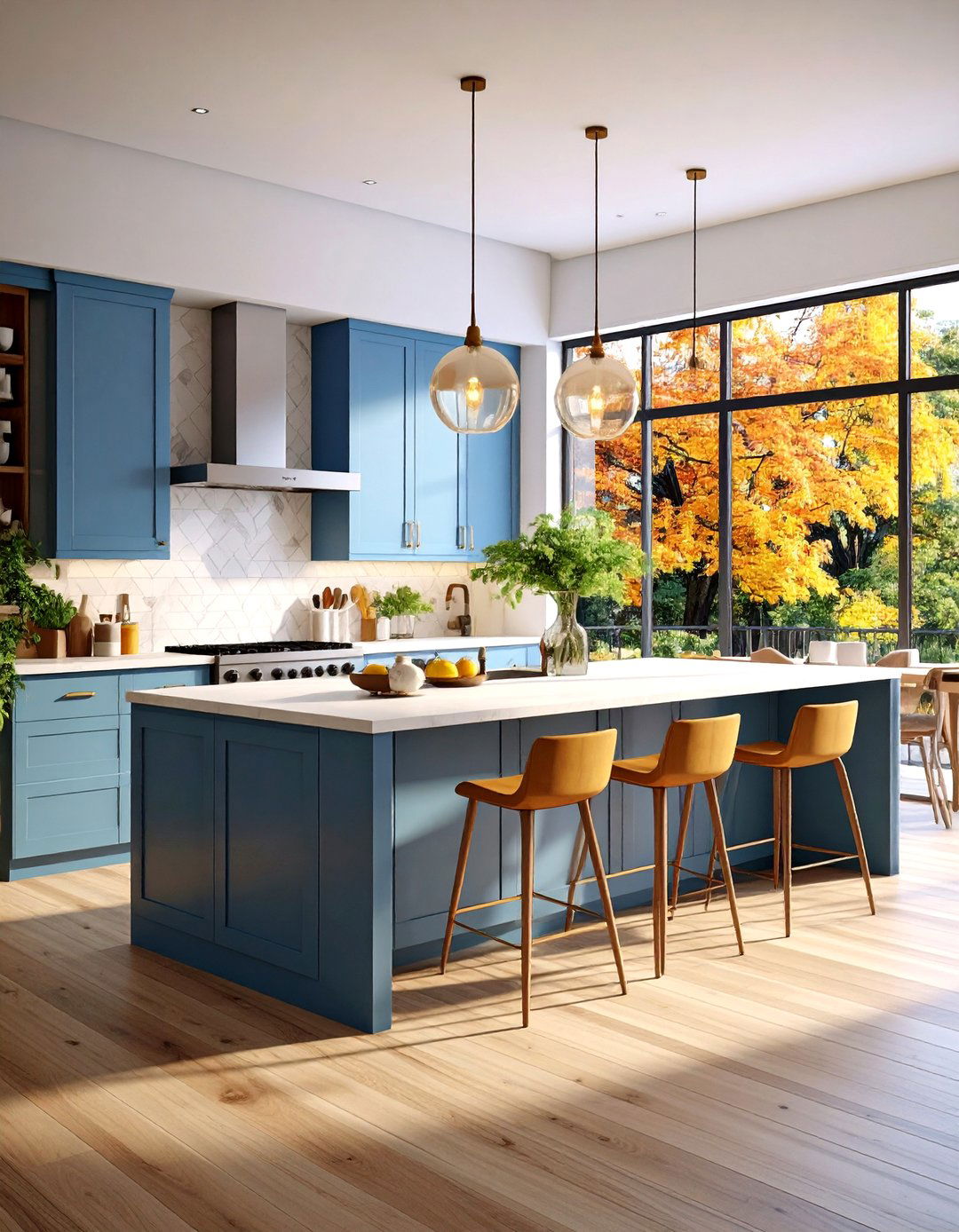
Kitchen peninsulas offer excellent alternatives to traditional upper cabinet storage while maintaining connection to surrounding living spaces. These connected islands provide substantial storage through base cabinets and can incorporate raised breakfast bars, open shelving, or display areas on the room-facing side. The peninsula's backside becomes an opportunity for creative storage solutions like pot racks, magnetic knife strips, or small appliance parking. Without upper cabinets above, peninsulas feel less imposing and maintain better traffic flow. The horizontal lines created by peninsula countertops emphasize the kitchen's openness while providing functional workspace and casual dining options.
10. Natural Light Kitchen Solutions
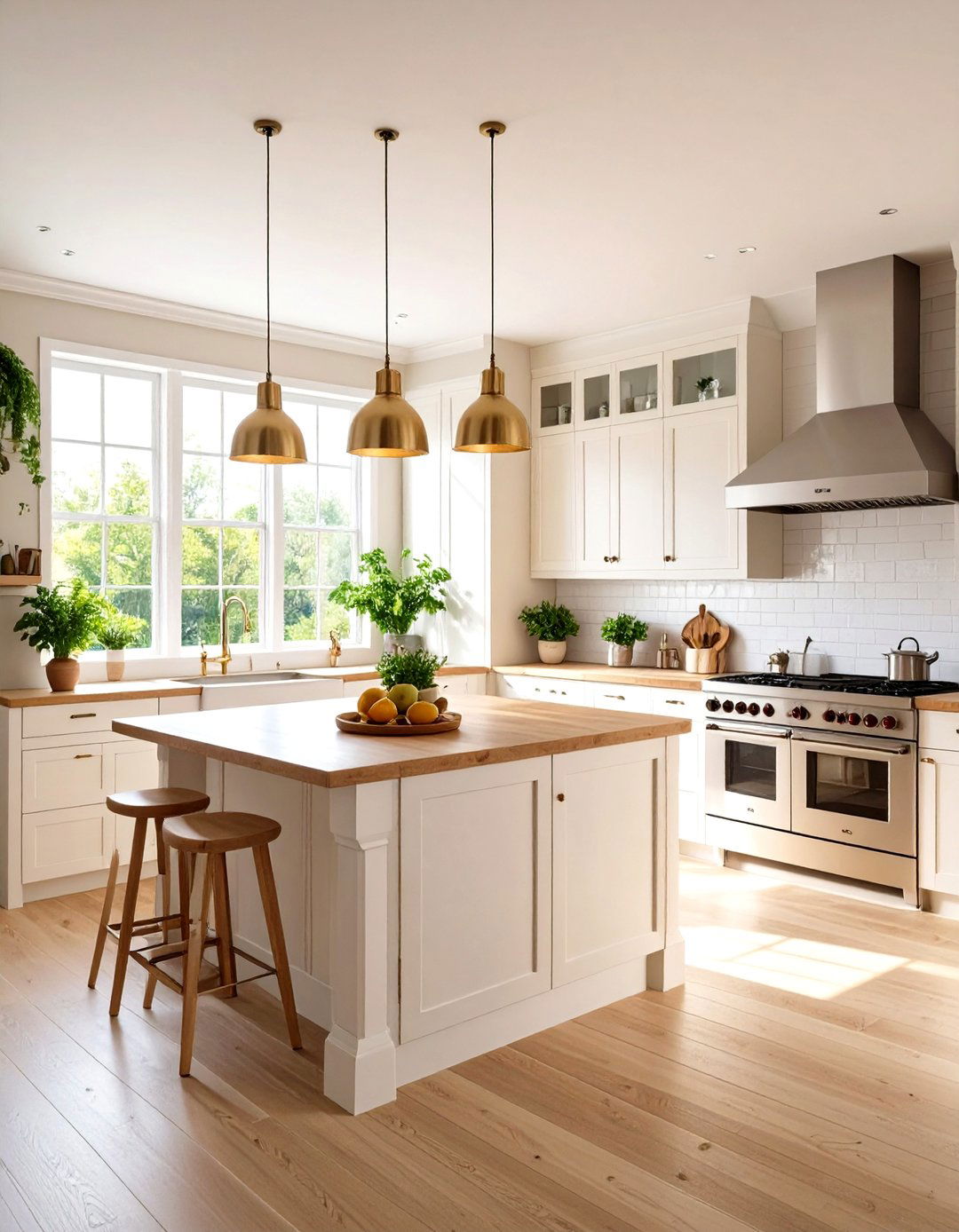
How much more enjoyable would your cooking experience be with abundant natural light throughout the day? Removing upper cabinets allows for strategic window placement that maximizes daylight penetration into work areas. South-facing windows provide consistent illumination, while east and west exposures offer dramatic lighting changes throughout the day. Skylights become viable options when upper cabinet soffits don't interfere with ceiling lines. Light-reflecting surfaces like white countertops, glossy backsplashes, and stainless steel appliances amplify natural illumination. The interplay between changing daylight and kitchen activities creates dynamic, ever-changing environments that make cooking more pleasant and energy-efficient.
11. Modern Farmhouse Kitchen Style
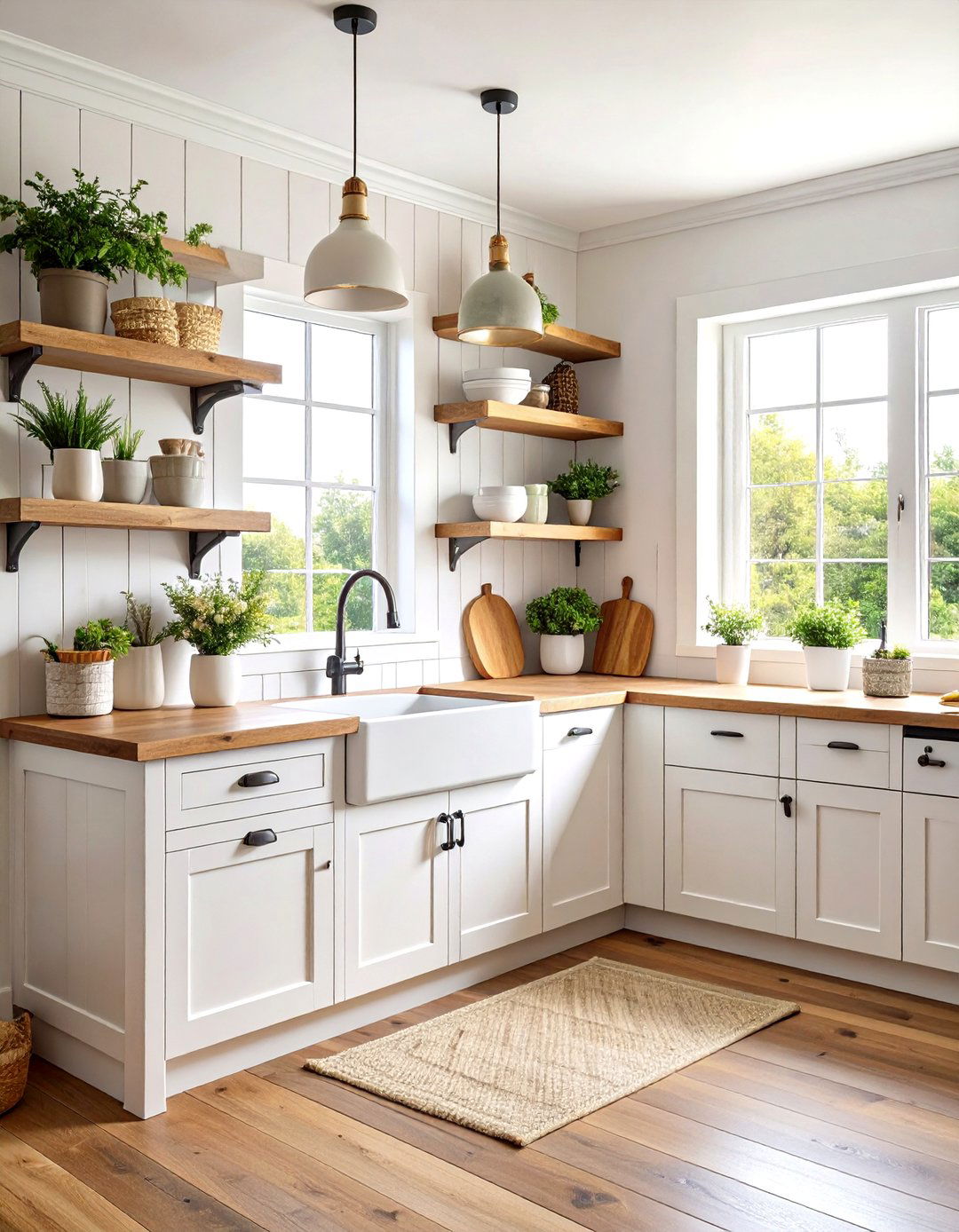
Modern farmhouse kitchens embrace the no-upper-cabinet trend beautifully, combining rustic charm with contemporary functionality. Open shelving displays vintage stoneware and mason jars, while large farmhouse sinks sit beneath picture windows overlooking gardens or pastoral views. Reclaimed wood floating shelves contrast beautifully with white subway tiles and painted shiplap walls. The absence of upper cabinets allows architectural details like exposed beams or vintage light fixtures to shine. Apron-front sinks, butcher block countertops, and vintage-inspired hardware maintain the farmhouse aesthetic while modern conveniences hide discretely in base cabinetry and walk-in pantries for the best of both worlds.
12. Industrial Kitchen Design Elements

Industrial-style kitchens without upper cabinets showcase raw materials and architectural honesty through exposed brick, steel beams, and concrete surfaces. Open metal shelving systems provide storage while reinforcing the industrial aesthetic. Pot racks, magnetic strips, and hanging utensil storage keep tools visible and accessible. Large factory-style windows flood the space with light while maintaining the urban loft feeling. Stainless steel appliances, concrete countertops, and minimal color palettes create cohesive industrial environments. The absence of traditional cabinetry allows architectural features like exposed ductwork, brick walls, or steel columns to become prominent design elements rather than obstacles to hide.
13. Small Kitchen Maximization Strategies
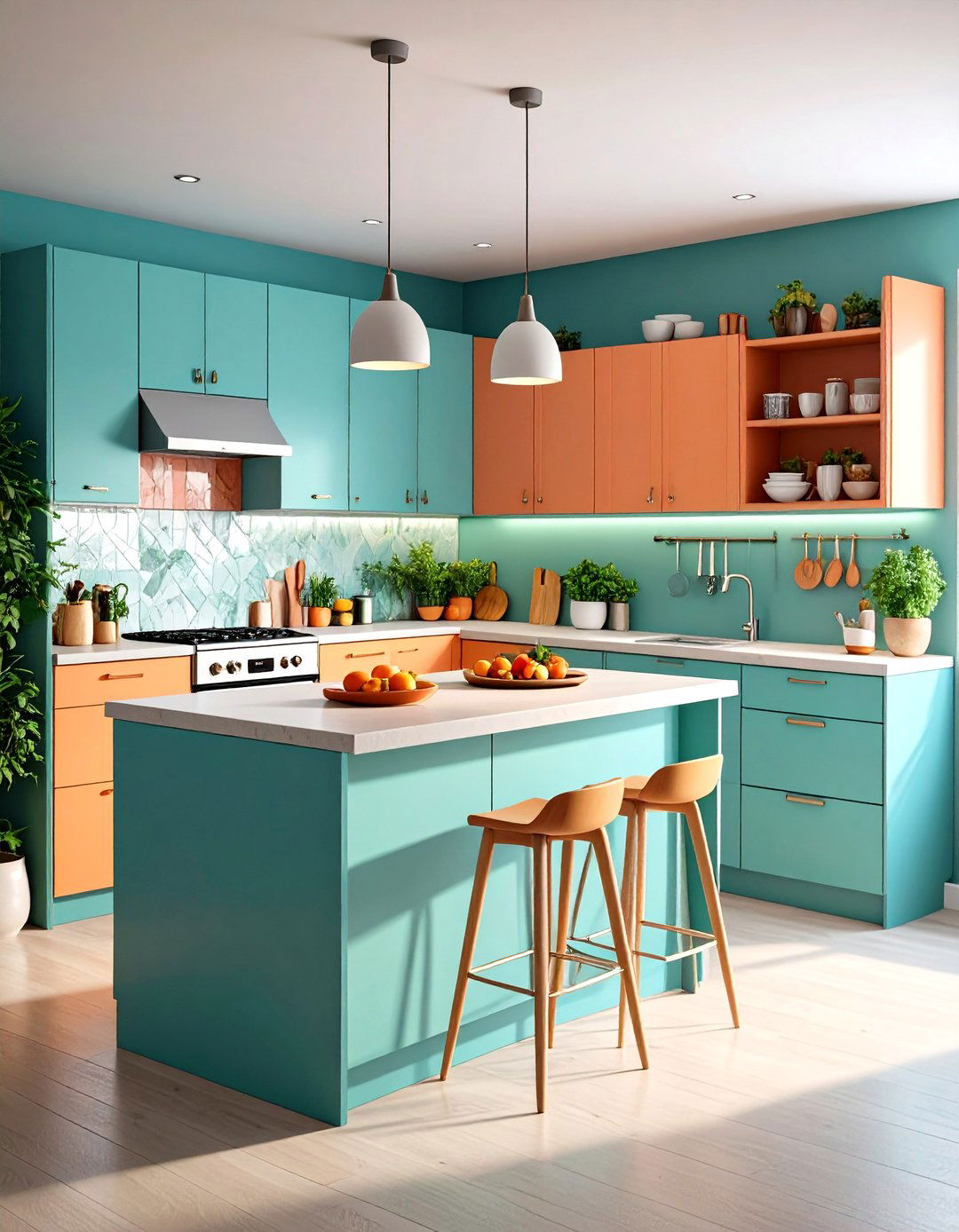
Small kitchens gain the most dramatic impact from eliminating upper cabinets, as the visual expansion makes cramped spaces feel significantly larger. Every vertical inch becomes precious, leading to creative solutions like magnetic spice storage, under-shelf baskets, and multi-functional furniture pieces. Compact islands on wheels provide mobile workspace and storage that can move aside when floor space is needed. Light colors and reflective surfaces amplify the sense of spaciousness created by removing visual barriers. Strategic placement of mirrors, glass shelving, or metallic accents further enhances the illusion of size while maintaining essential storage through clever organizational systems.
14. Kitchen Backsplash Showcase Designs
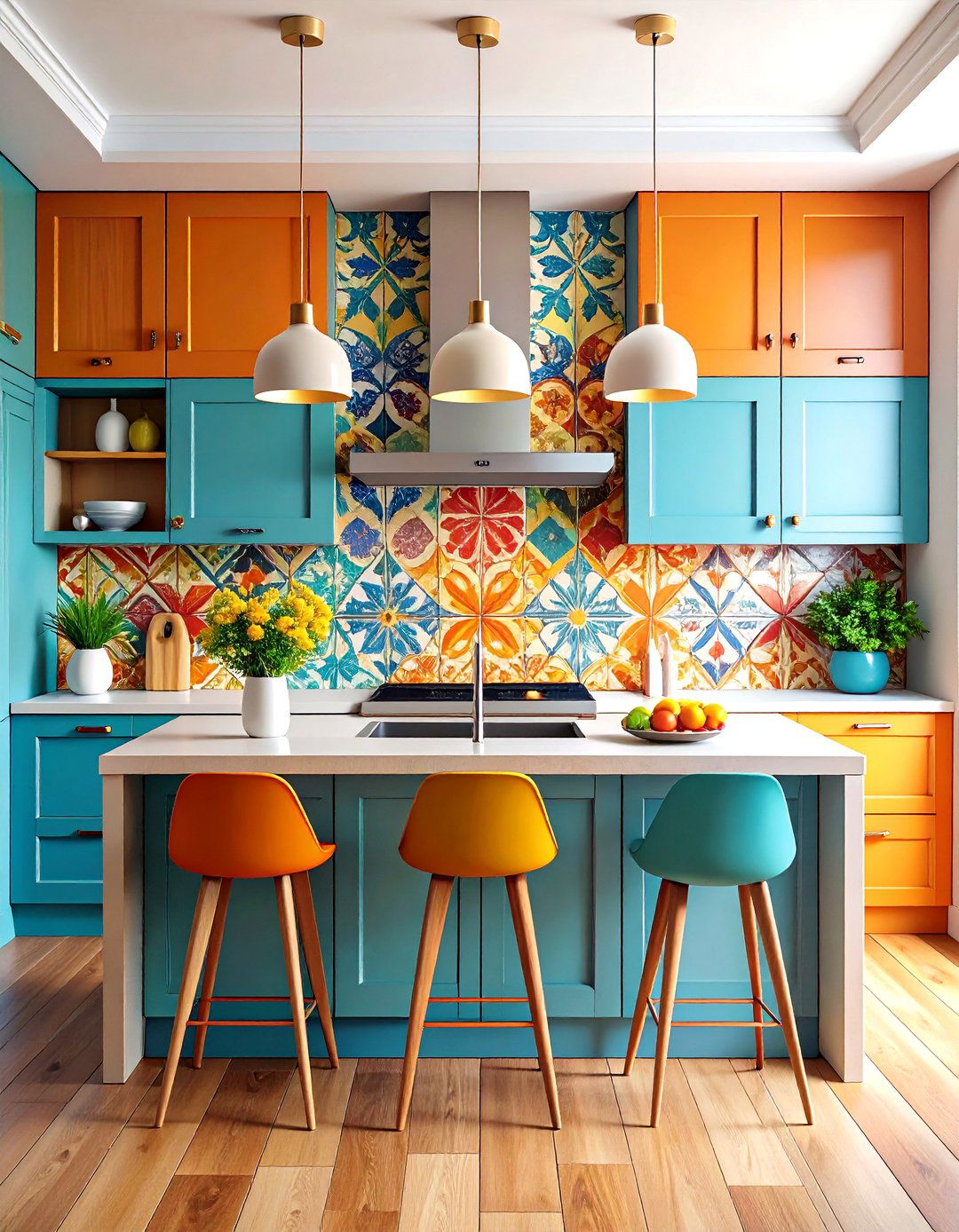
Without upper cabinets to break up wall space, backsplashes become prominent design features that can extend dramatically upward. This expanded canvas allows for bold patterns, artistic tiles, or continuous natural stone installations that create stunning focal points. Subway tiles can stack higher, creating classic vertical emphasis, while large format tiles minimize grout lines for seamless surfaces. Metallic finishes, mirror tiles, or decorative glass reflect light and create visual interest. The extended backsplash area provides opportunities for integrated storage solutions like recessed spice niches, magnetic strips, or slim shelving that maintains the clean, uninterrupted aesthetic while adding functionality.
15. Dining Kitchen Integration Spaces
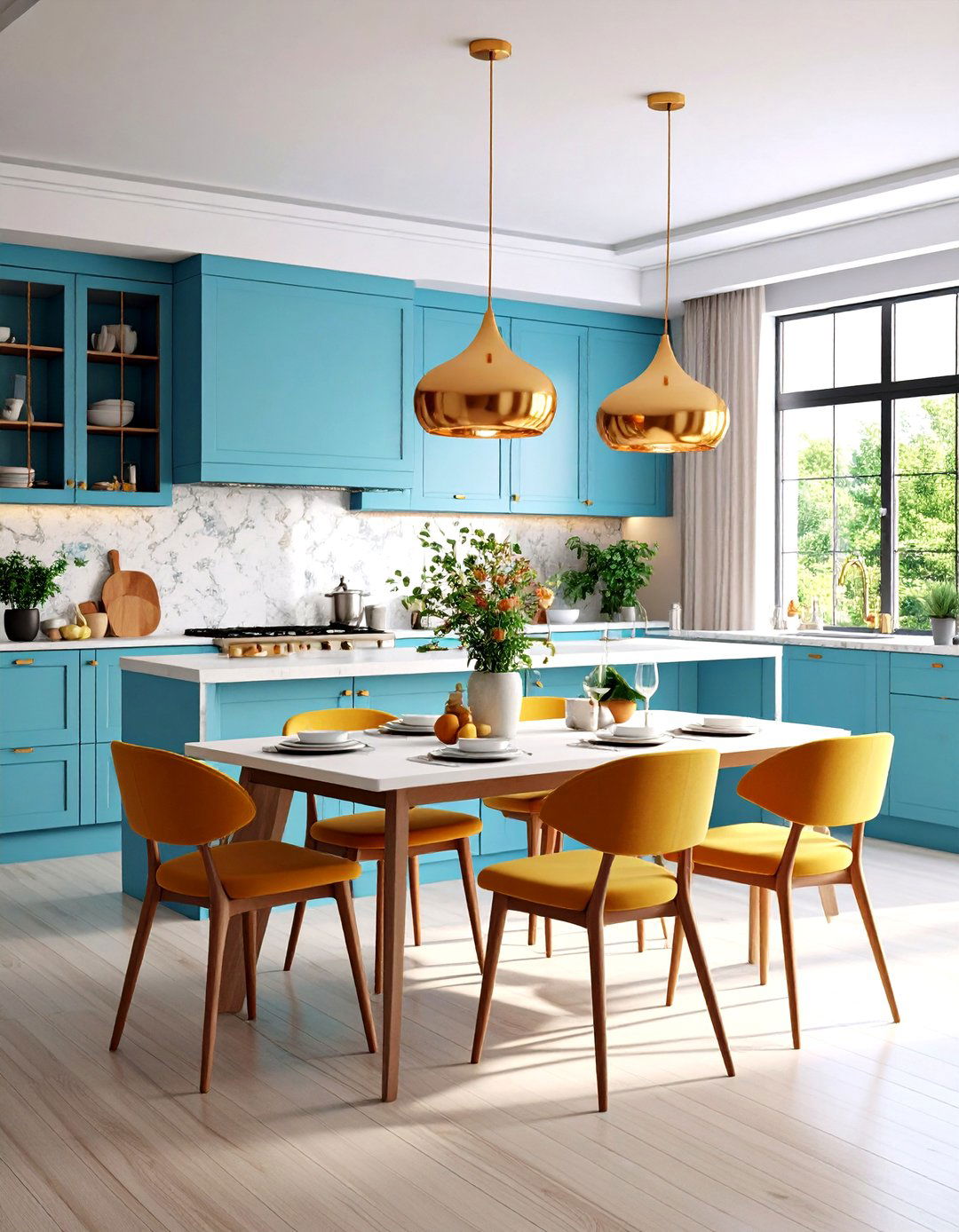
Kitchens without upper cabinets integrate more seamlessly with dining areas, creating cohesive entertaining spaces where cooking and socializing blend naturally. The visual continuity allows furniture pieces, lighting, and color schemes to flow uninterrupted between zones. Kitchen islands can incorporate dining height seating, while peninsulas create natural divisions without blocking sight lines. Consistent flooring, window treatments, and architectural details unify the space. This integration encourages more social cooking experiences where family and guests can interact comfortably with the cook without feeling separated by cabinet barriers or cramped in tight kitchen quarters.
16. Scandinavian Kitchen Aesthetics

What if your kitchen could embody the serene simplicity that makes Scandinavian design so timelessly appealing? Light wood tones, white surfaces, and minimal ornamentation create calming environments that prioritize function and beauty equally. Simple floating shelves display beautiful ceramics and glassware against crisp white walls. Large windows maximize precious daylight during long winter months. Natural materials like birch, oak, and stone connect the interior to Nordic landscapes. The absence of upper cabinets supports the Scandinavian principle of lagom – having just enough – by encouraging thoughtful curation of possessions and emphasizing quality over quantity in every design choice.
17. Contemporary Kitchen Innovation
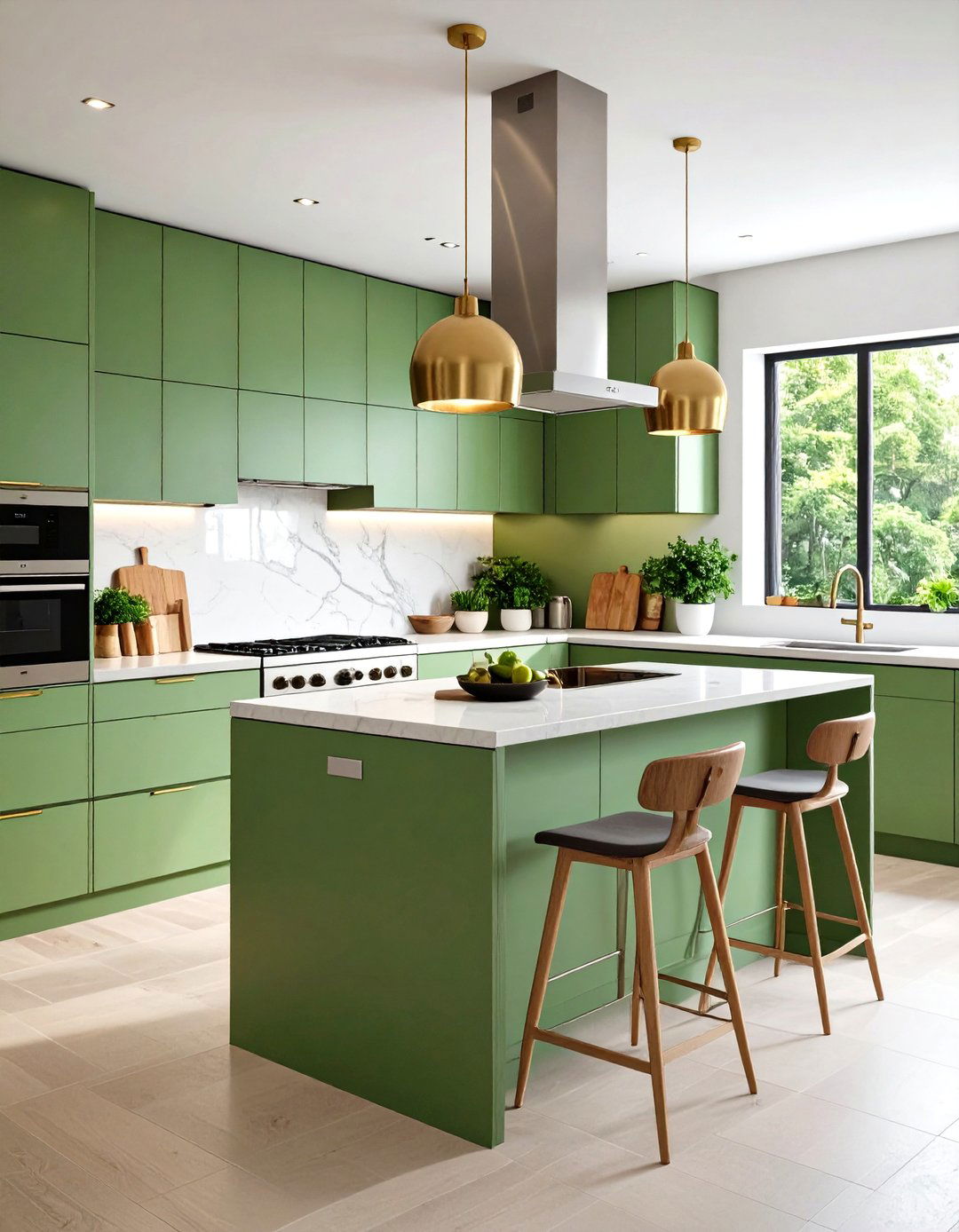
Contemporary kitchens without upper cabinets push design boundaries through innovative materials, integrated technology, and seamless functionality. Handle-less base cabinets create smooth, uninterrupted surfaces while hidden storage solutions maximize capacity. Smart home integration allows for automated lighting, climate control, and appliance management. Waterfall countertops, integrated sinks, and hidden appliances maintain clean aesthetic lines. Advanced ventilation systems eliminate the need for bulky range hoods. Color-changing LED lighting adapts to different times of day and activities. These kitchens represent the cutting edge of design thinking, where traditional boundaries between storage, workspace, and living areas dissolve into fluid, adaptable environments.
18. Traditional Kitchen Adaptations

Traditional kitchen styles adapt beautifully to the no-upper-cabinet trend while maintaining their classic charm and familiar comfort. Raised panel base cabinets, decorative moldings, and vintage-inspired hardware preserve historical character. China hutches, armoires, or built-in display cases provide upper storage while serving as furniture pieces rather than fitted cabinetry. Crown molding at ceiling height maintains traditional proportions without actual cabinets. Classic materials like marble countertops, subway tiles, and hardwood floors anchor the traditional aesthetic. Period-appropriate lighting fixtures and window treatments complete the look while allowing the benefits of increased light and openness that contemporary homeowners desire.
19. Open Concept Kitchen Flow
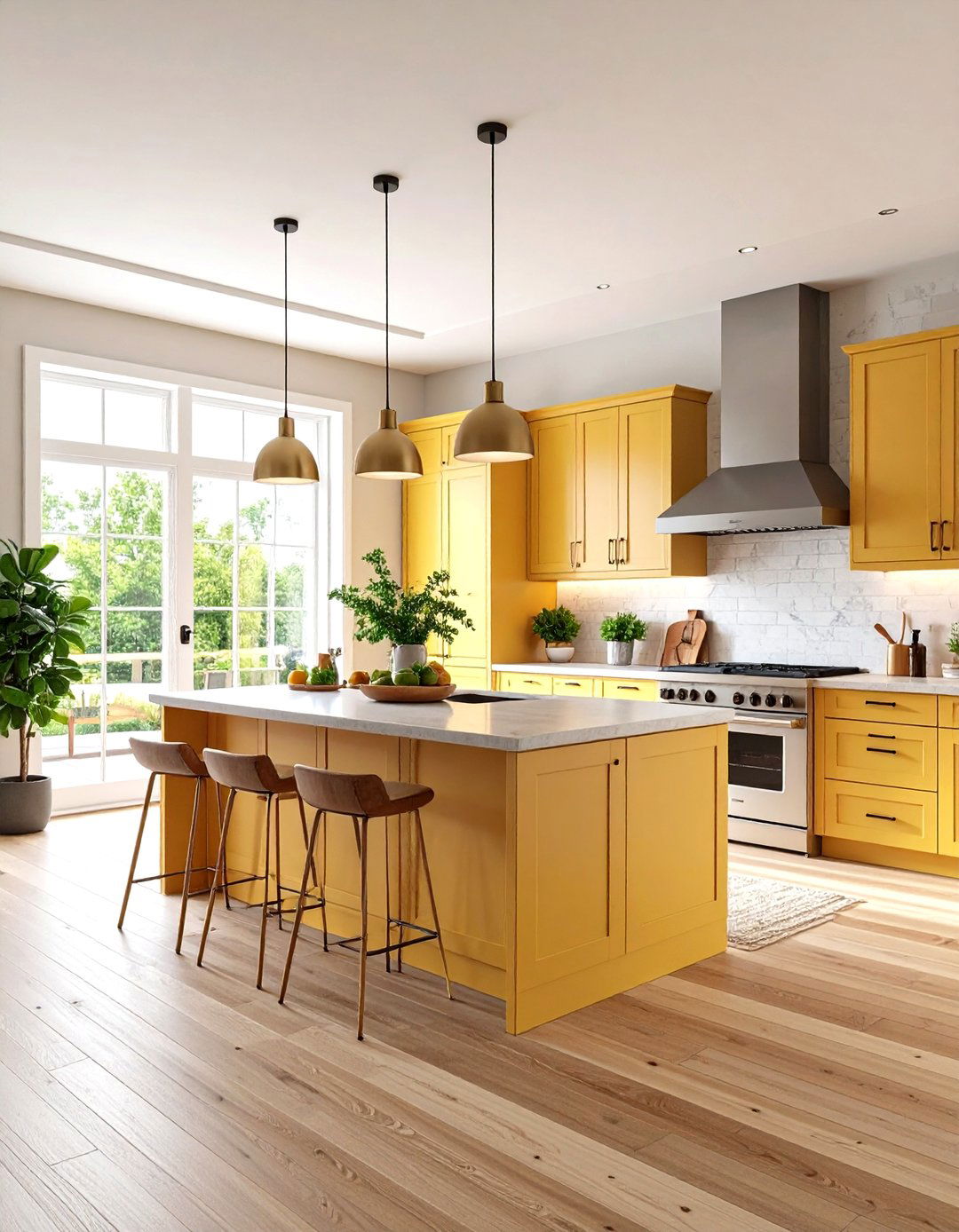
Open concept homes benefit tremendously from kitchens without upper cabinets, as the removal of visual barriers creates seamless flow between living, dining, and cooking areas. Sight lines extend unobstructed across the entire space, making both the kitchen and adjacent rooms feel larger. Consistent ceiling heights, flooring materials, and color palettes unify the space. Kitchen islands often serve as natural room dividers while maintaining openness. Furniture placement becomes more flexible when kitchen boundaries blur. The result is a more social, interactive environment where cooking becomes part of the entertainment rather than isolation from family activities.
20. Vintage Kitchen Character Elements
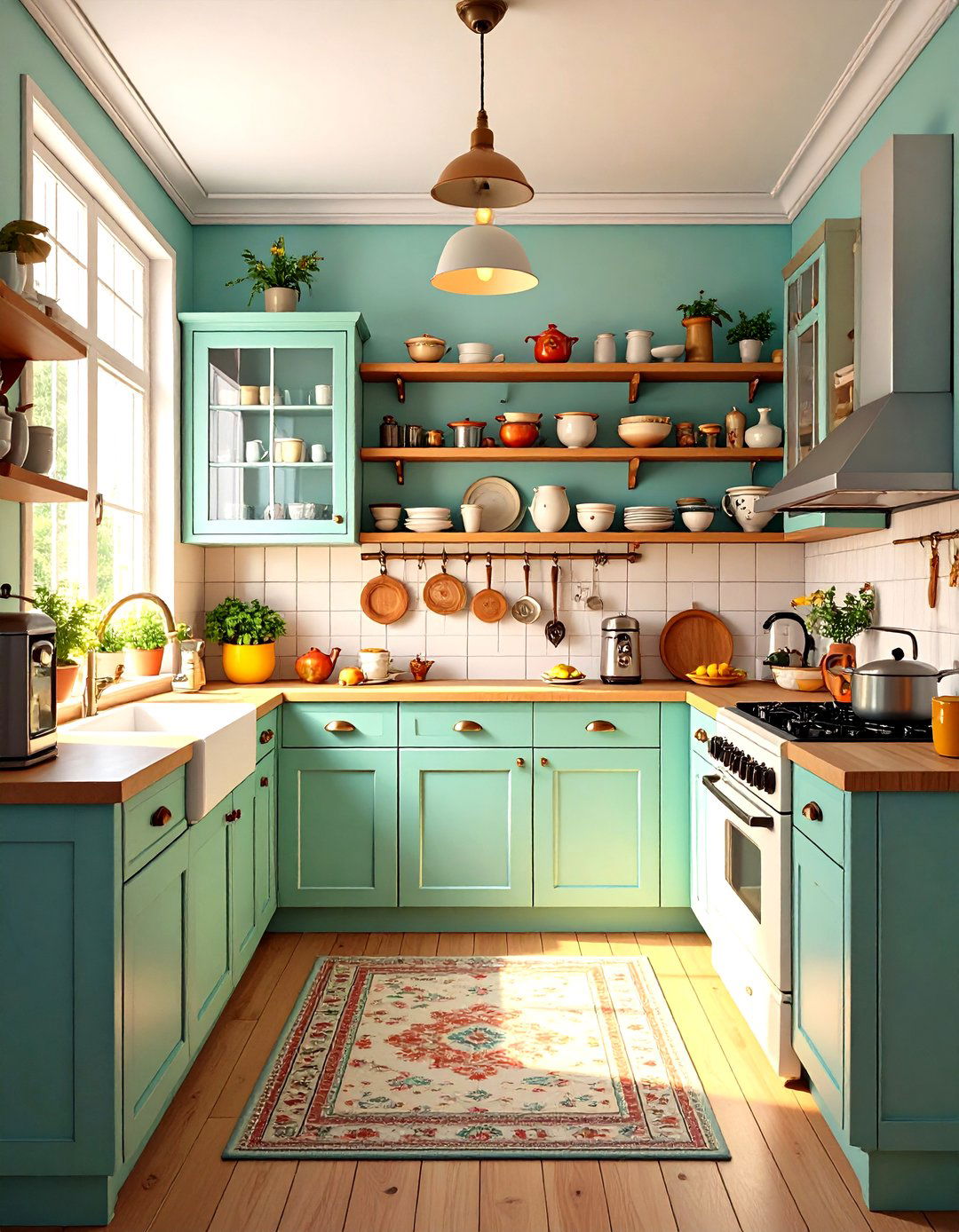
Vintage-inspired kitchens without upper cabinets celebrate historical character while accommodating modern lifestyles beautifully. Period-appropriate open shelving displays vintage dishware, antique canisters, and collectible pottery. Farmhouse sinks, vintage-style appliances, and reclaimed materials create authentic historical atmosphere. Glass-front pantry doors, vintage hardware, and traditional lighting fixtures maintain period authenticity. The absence of modern upper cabinets allows original architectural details like crown molding, wainscoting, or exposed beams to shine. Vintage textiles, retro color schemes, and antique accessories complete the historical narrative while providing all the functionality contemporary families require for daily living.
21. Kitchen Workspace Efficiency Zones
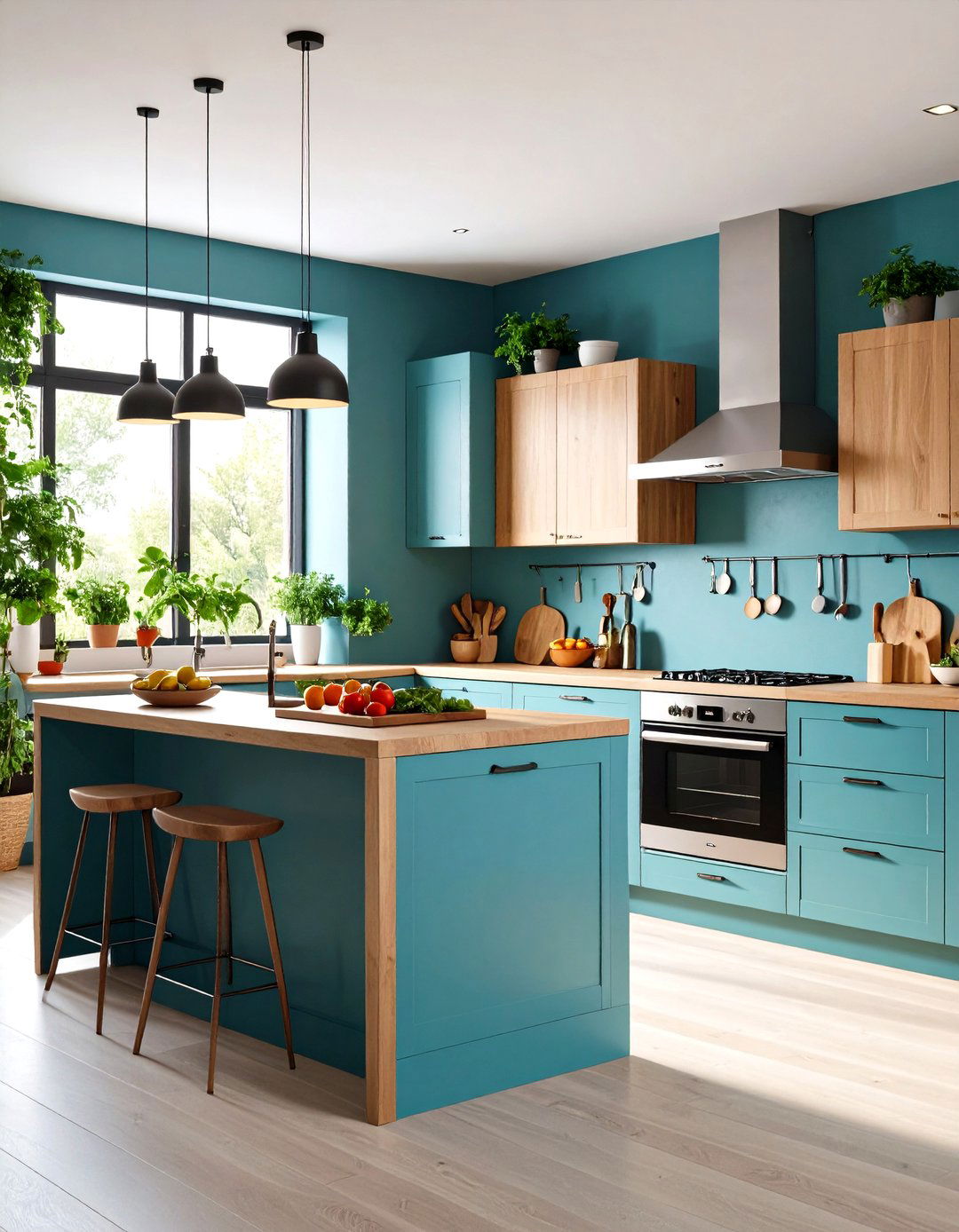
Efficient kitchens without upper cabinets organize workspace into specialized zones that maximize productivity and minimize movement during cooking tasks. Prep zones center around sinks with integrated cutting boards and nearby knife storage. Cooking areas feature easy access to pots, pans, and utensils through drawer systems and open storage. Cleanup zones organize dish storage near dishwashers and drying areas. Each zone maintains its own microenvironment of tools and supplies while contributing to the overall kitchen workflow. Strategic placement of these zones creates natural work triangles that make cooking more efficient and enjoyable, proving that good design transcends the presence or absence of upper cabinets.
22. Kitchen Color Scheme Harmony

Color schemes in kitchens without upper cabinets can be bolder and more cohesive since there are fewer surfaces to coordinate. Monochromatic palettes create serene, sophisticated environments that emphasize architectural details and natural light. Two-tone schemes use base cabinets and islands as accent pieces against neutral walls and backsplashes. Bold accent walls become possible when upper cabinets don't compete for visual attention. Natural materials like wood and stone provide organic color variation that changes with lighting throughout the day. The expanded wall space allows for artistic expression through paint, wallpaper, or decorative finishes that would overwhelm a traditional kitchen.
23. Kitchen Lighting Design Strategies
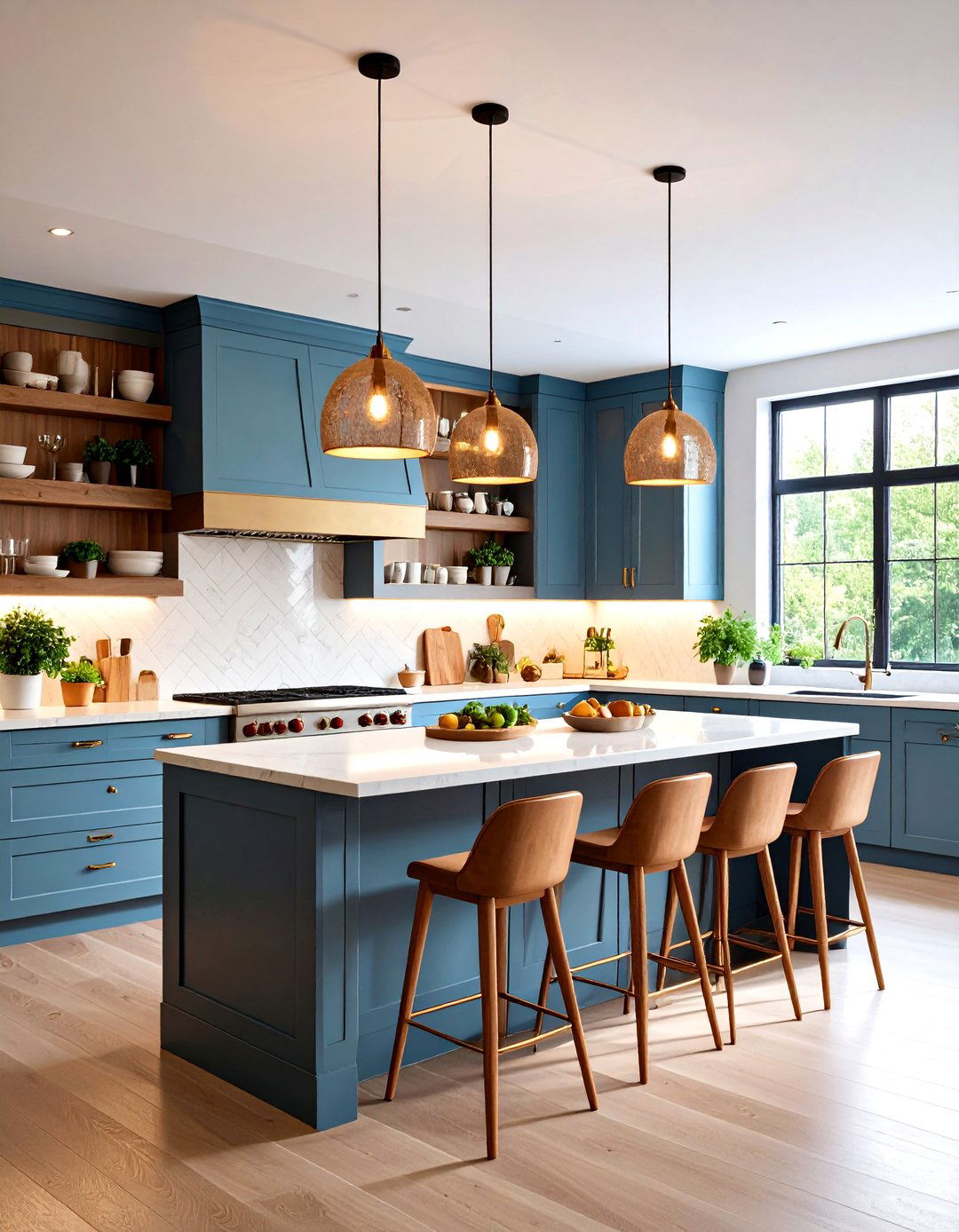
Lighting design becomes more important and more creative in kitchens without upper cabinets, as task lighting traditionally hidden under wall cabinets must find new solutions. Pendant lights over islands and peninsulas provide focused task lighting while serving as decorative elements. Under-shelf lighting illuminates floating shelves and their contents. Recessed ceiling lights offer general illumination without visual interference. Window-adjacent task lighting supplements natural daylight. Statement light fixtures become possible focal points when upper cabinets don't compete for ceiling space. Layered lighting schemes create ambiance for different times of day and activities, making the kitchen equally functional for morning coffee preparation and evening entertaining.
24. Kitchen Appliance Integration Methods
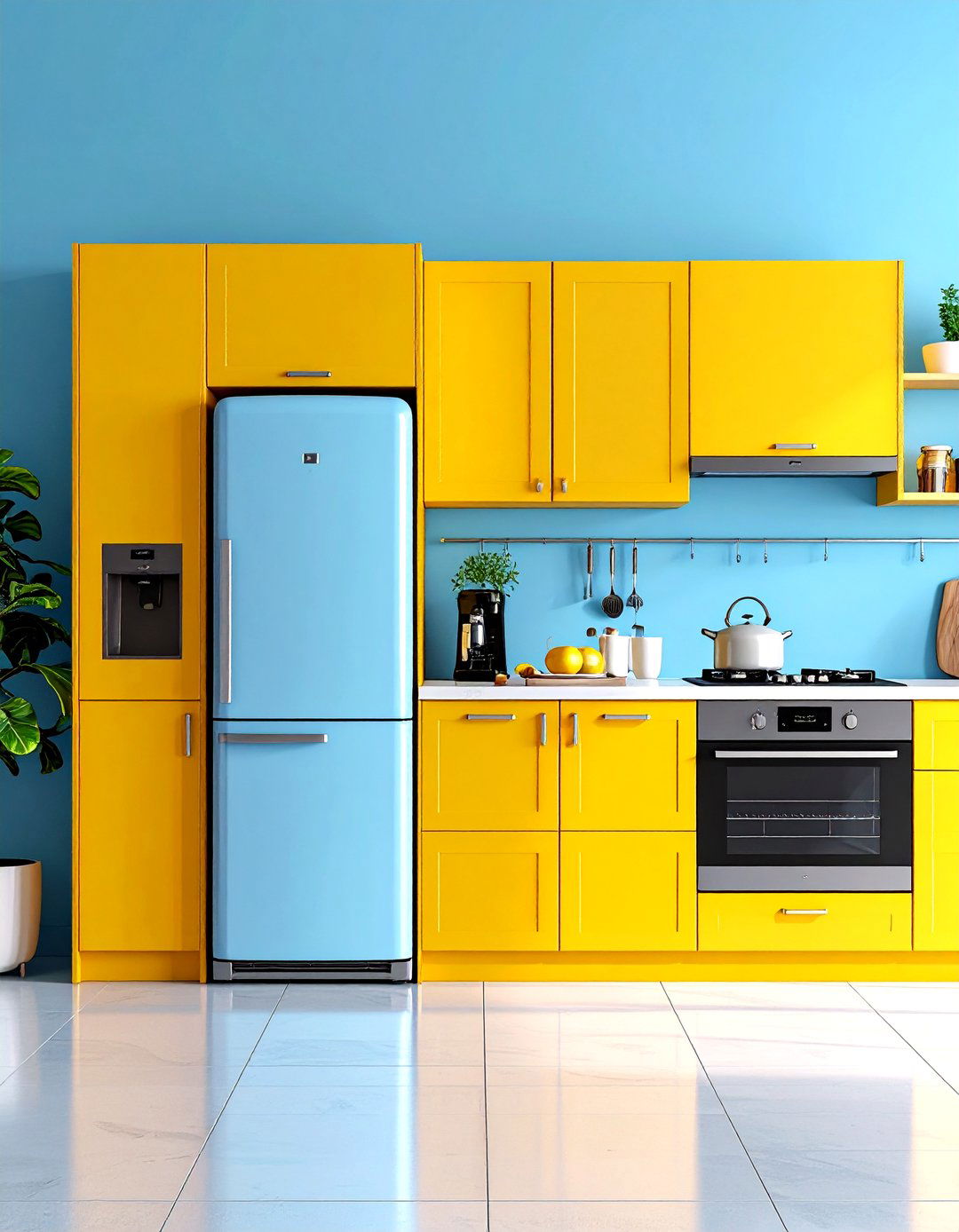
Kitchen appliances integrate more seamlessly into designs without upper cabinets, as the visual emphasis shifts to horizontal lines and surface continuity. Built-in refrigerators hide behind matching cabinetry panels for seamless integration. Range hoods become architectural statements rather than necessary intrusions. Microwave drawers and steam ovens integrate into base cabinets or islands. Small appliances find homes in appliance garages or dedicated pantry areas. Counter depth appliances maintain clean lines without protruding into walkways. The absence of upper cabinet visual competition allows appliances to either blend invisibly into the design or serve as intentional focal points that enhance rather than disrupt the overall aesthetic harmony.
Conclusion:
Kitchens without upper cabinets represent more than just a design trend; they embody a fundamental shift toward more open, light-filled, and socially oriented cooking spaces. This approach challenges traditional storage assumptions while creating opportunities for innovative organization solutions, enhanced natural lighting, and seamless integration with living areas. The resulting environments feel more spacious, contemporary, and welcoming, transforming kitchens from purely functional workspaces into the true hearts of modern homes. Whether achieved through floating shelves, expanded islands, or strategic pantry planning, these designs prove that beautiful, functional kitchens can thrive without wall-mounted storage, offering homeowners freedom to prioritize openness, light, and architectural beauty in their most important gathering spaces.


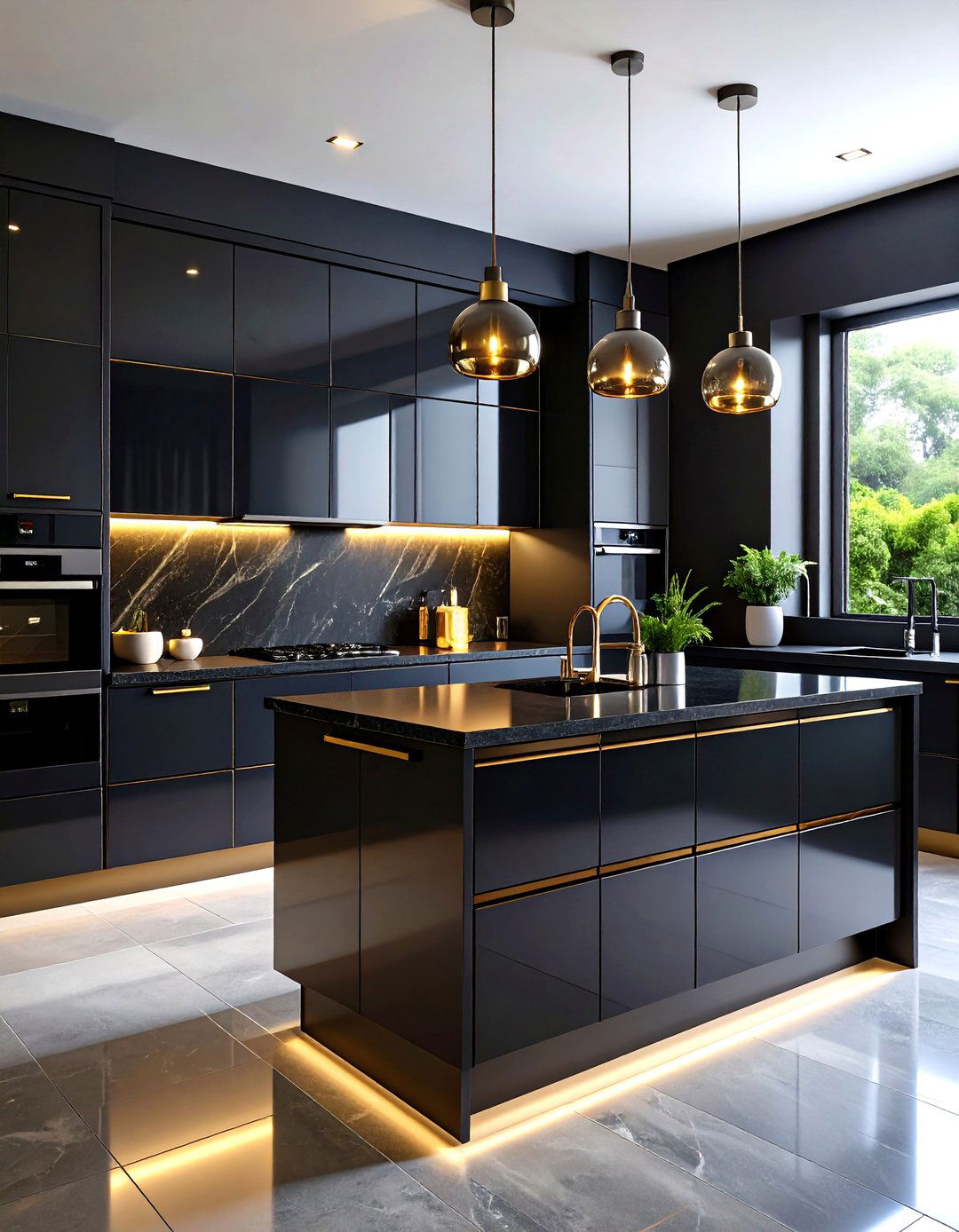
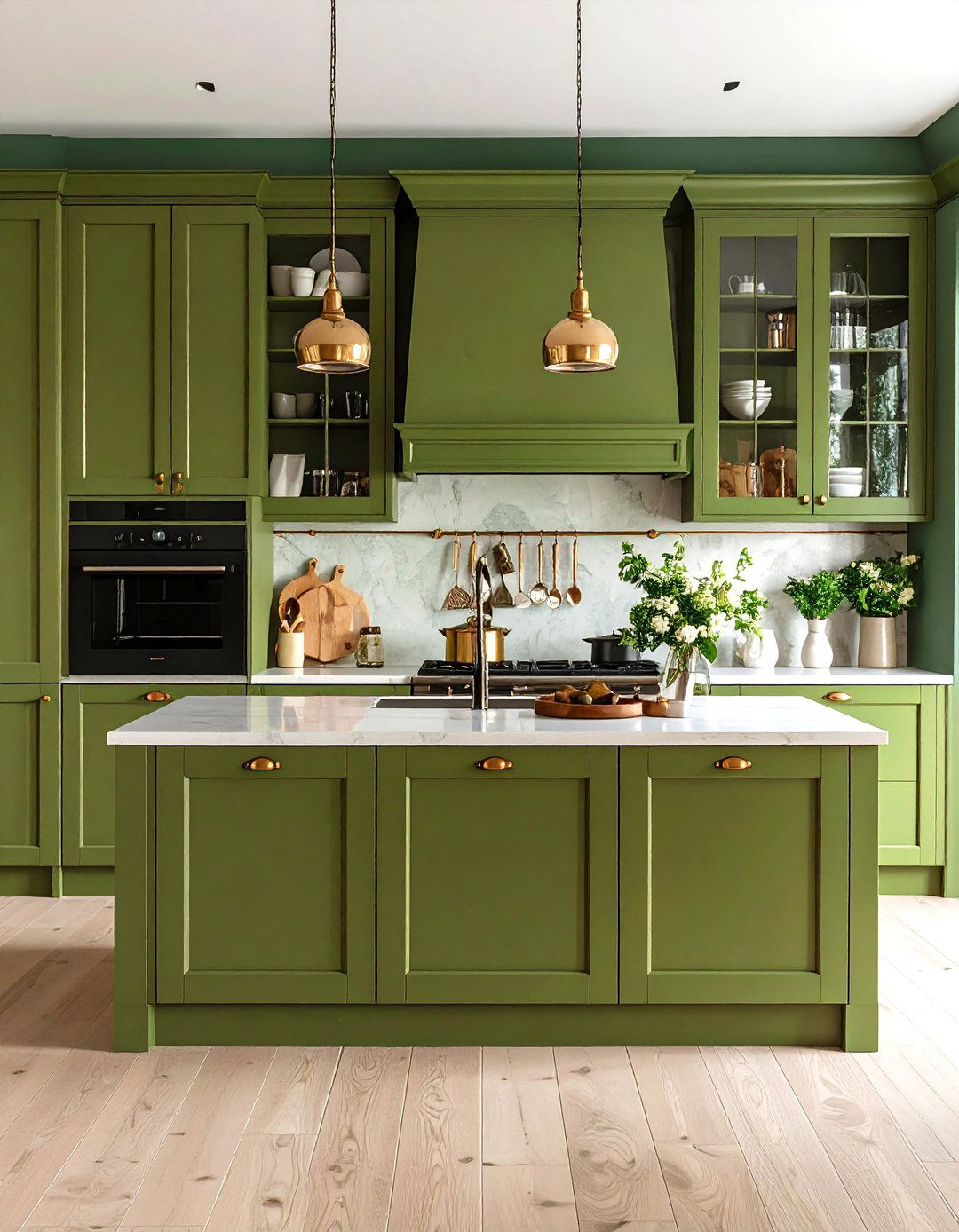
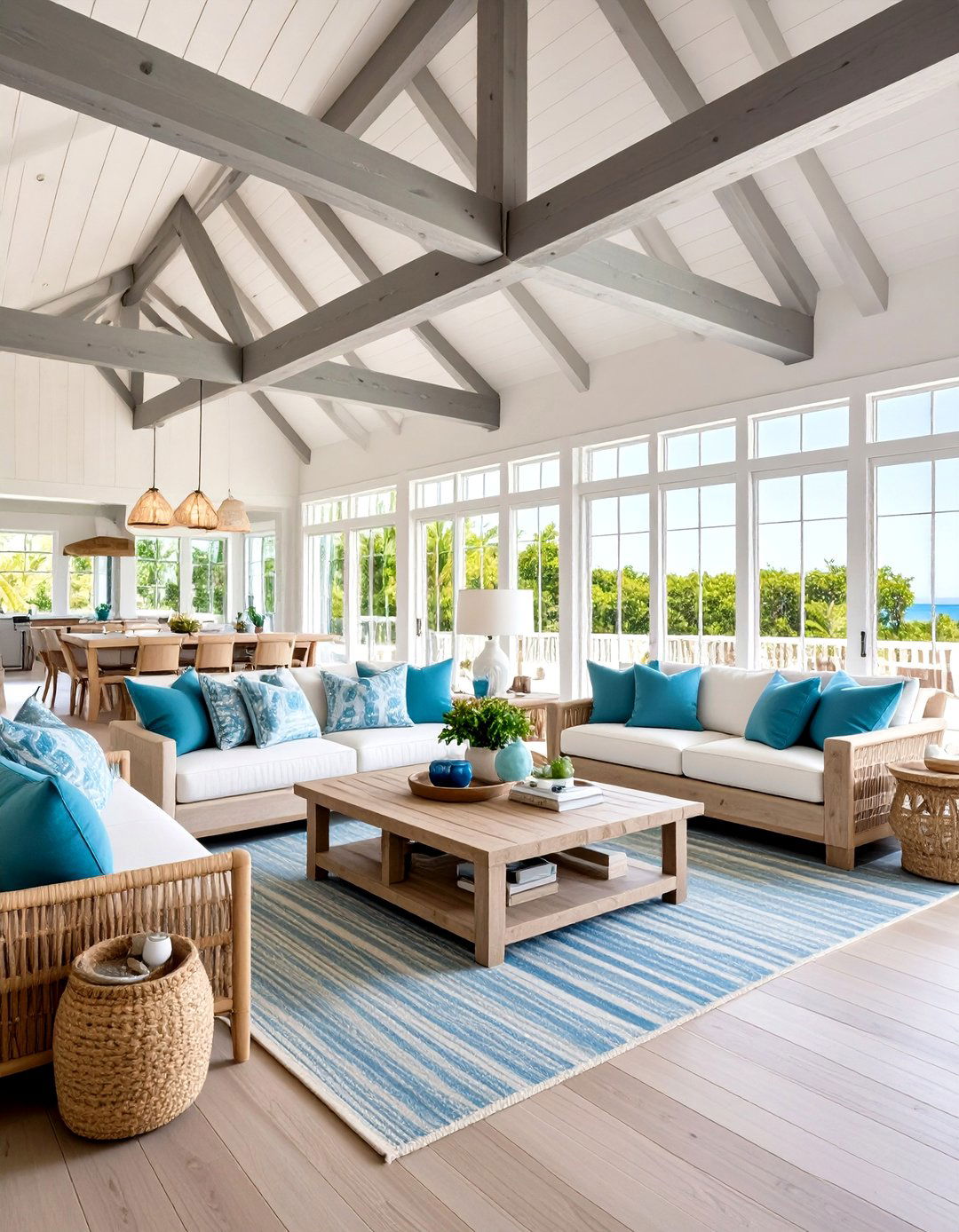
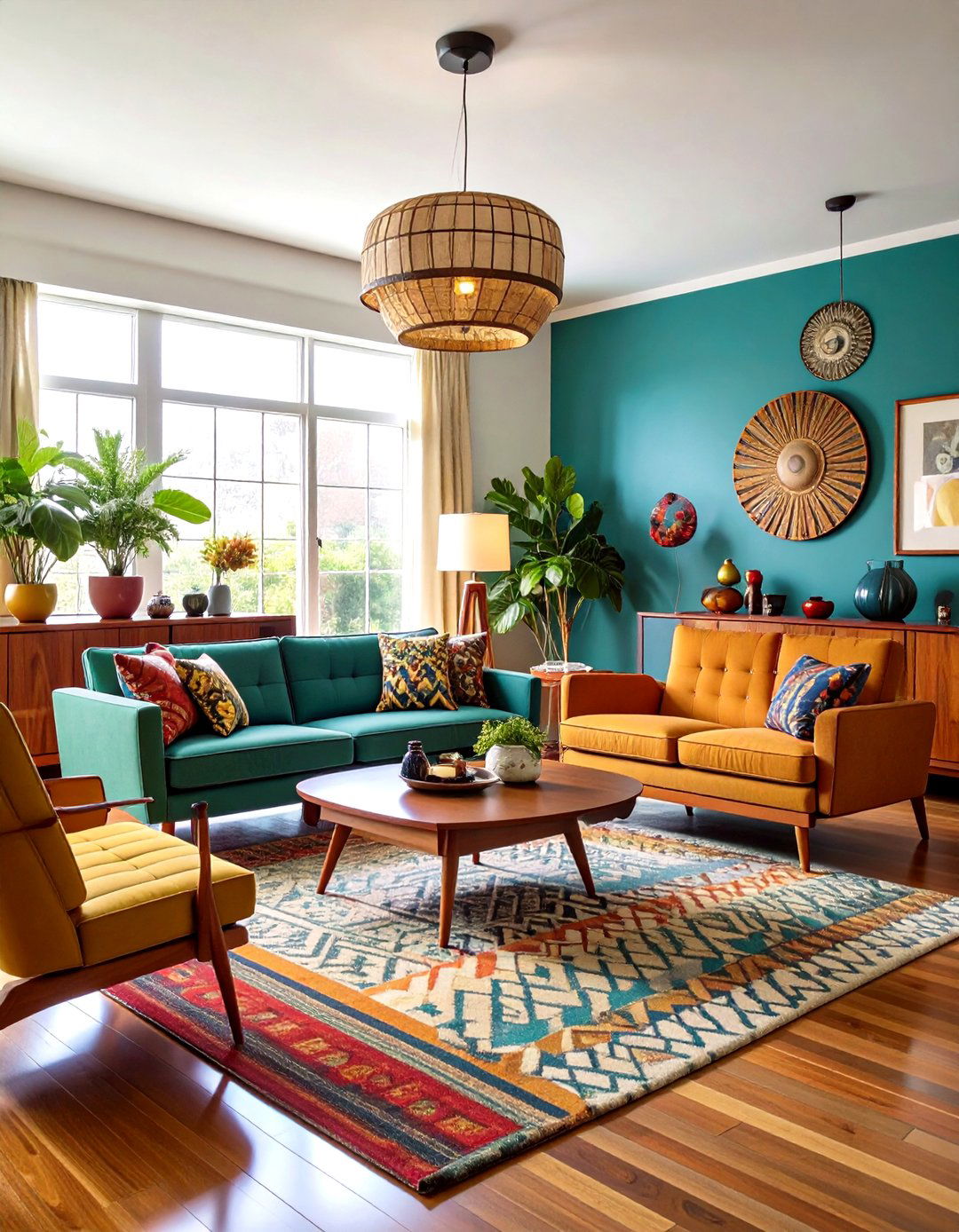

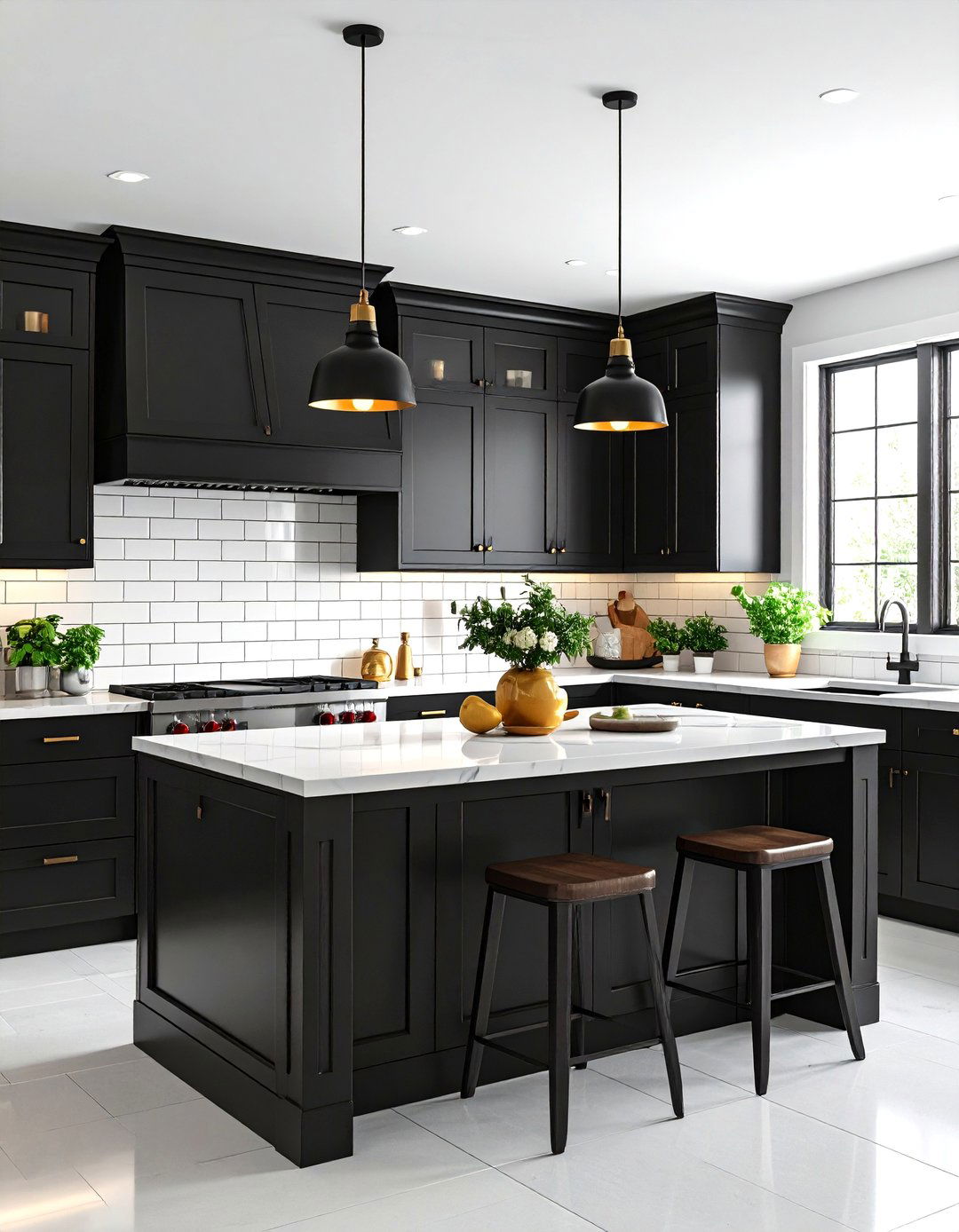
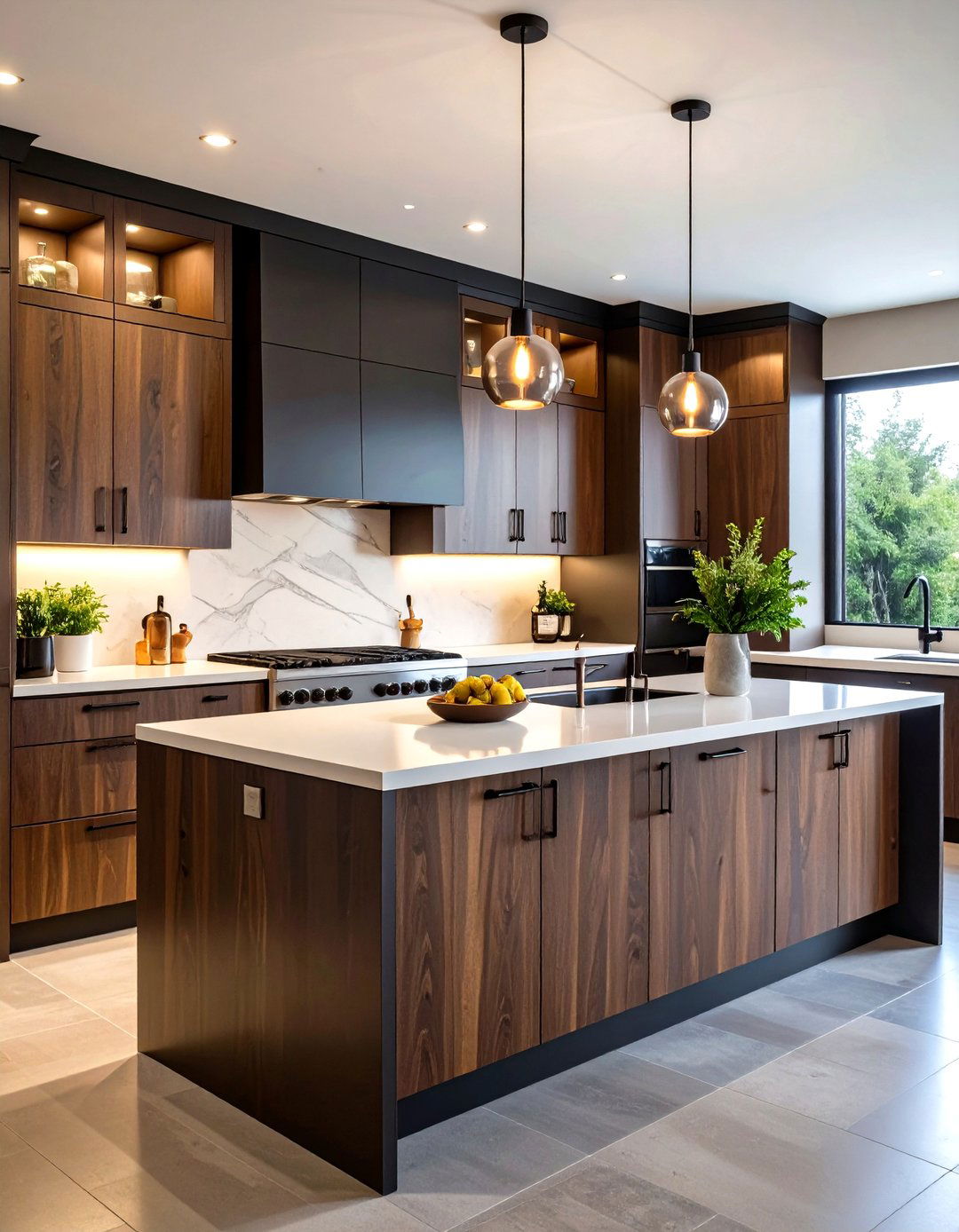
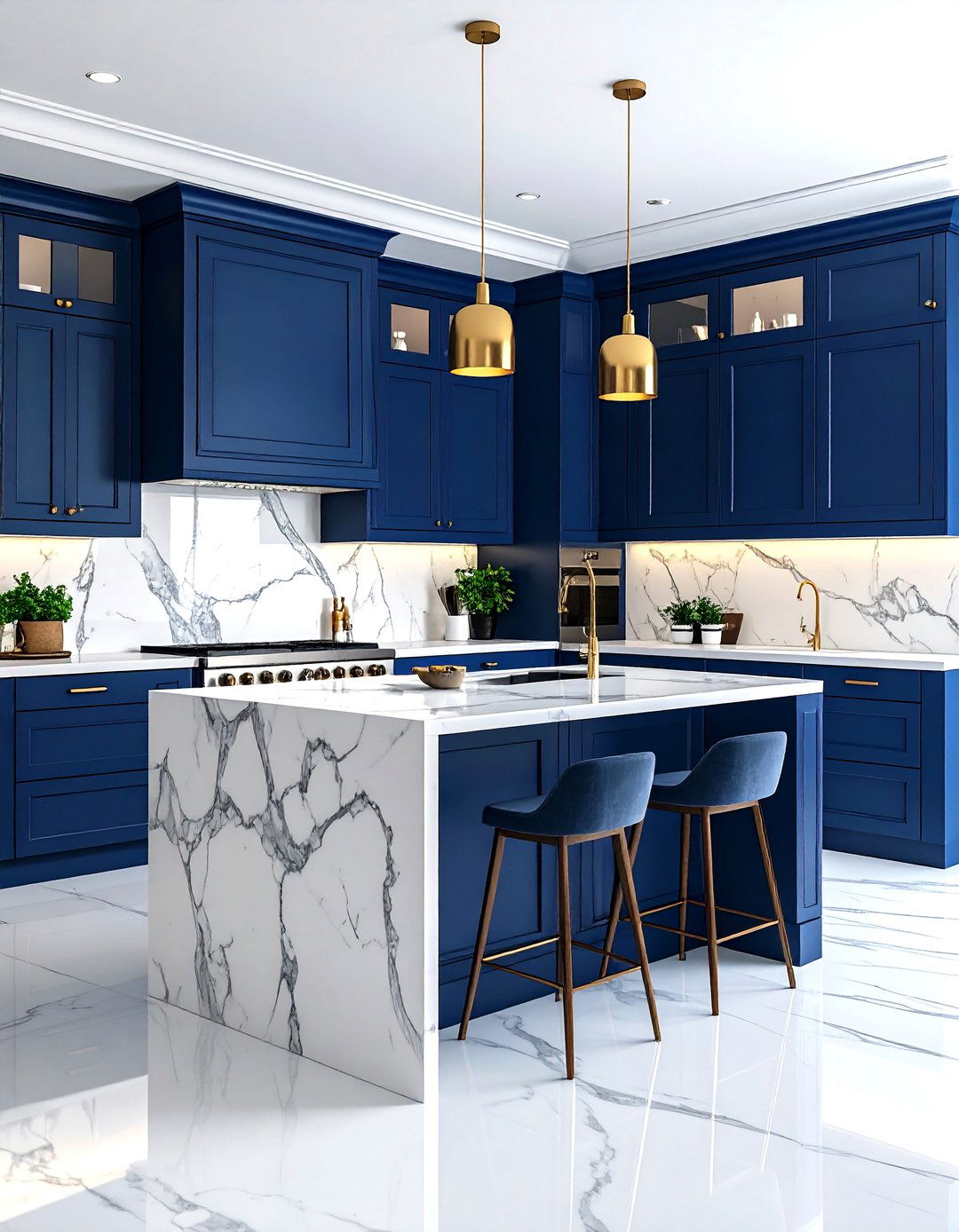
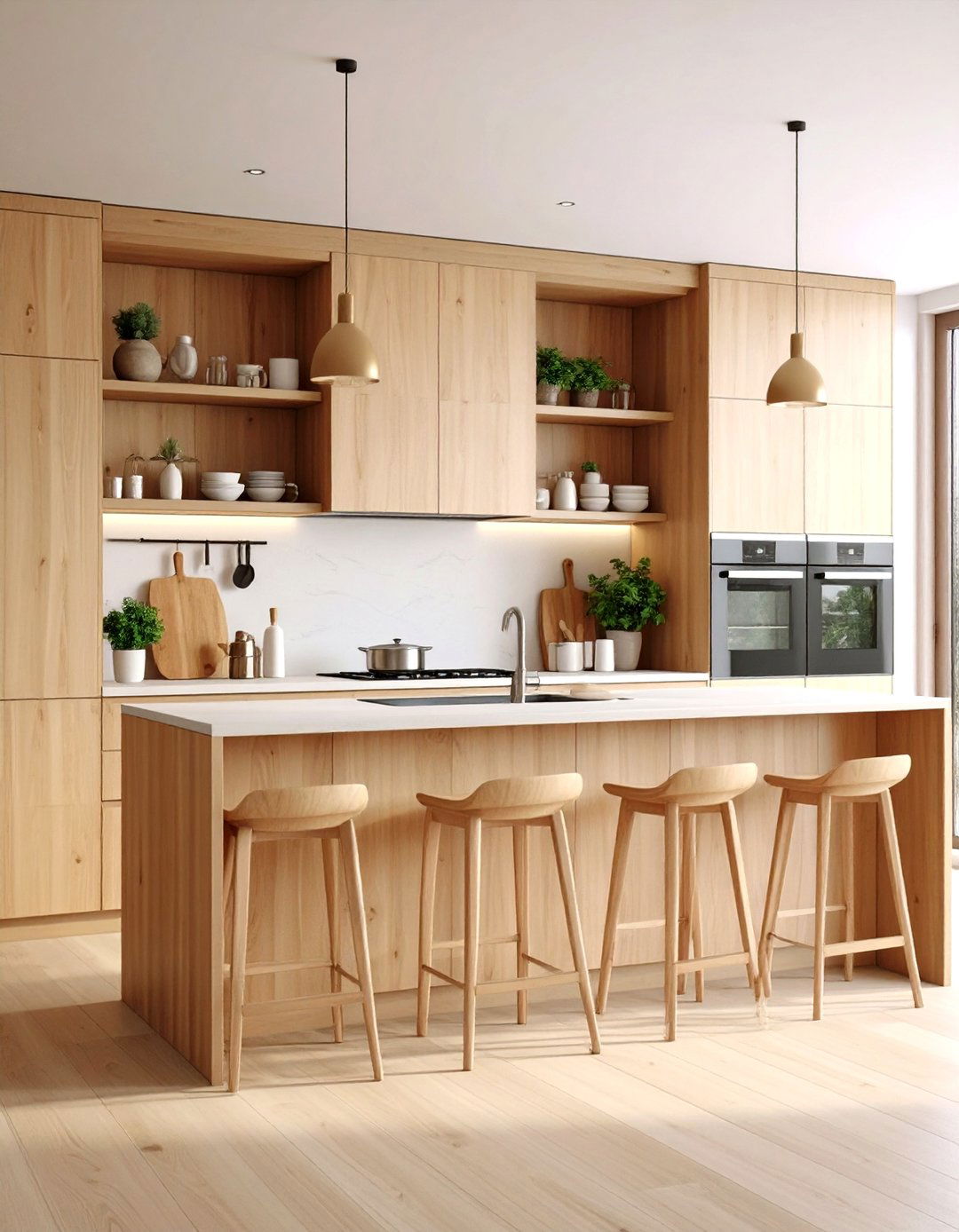


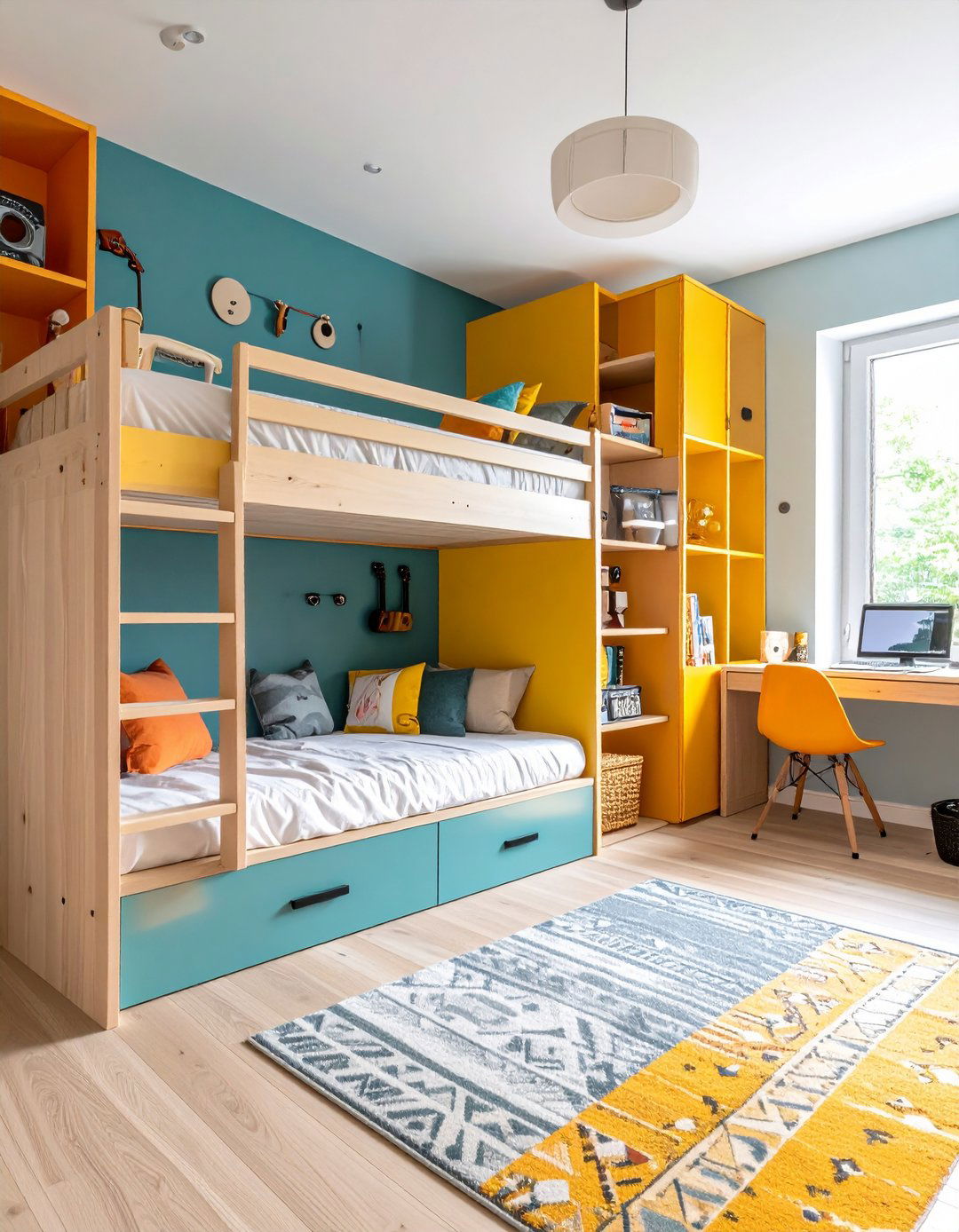



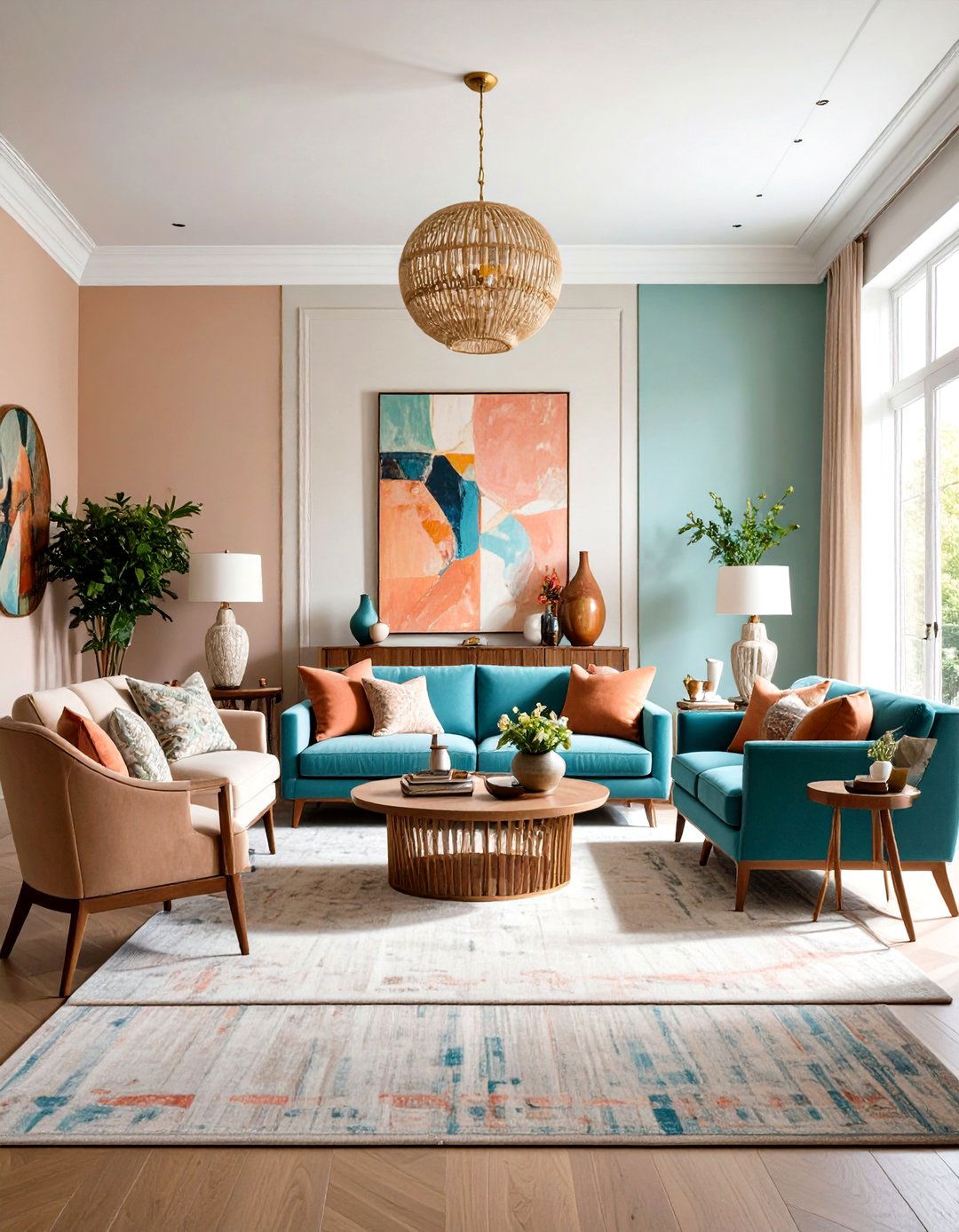


Leave a Reply